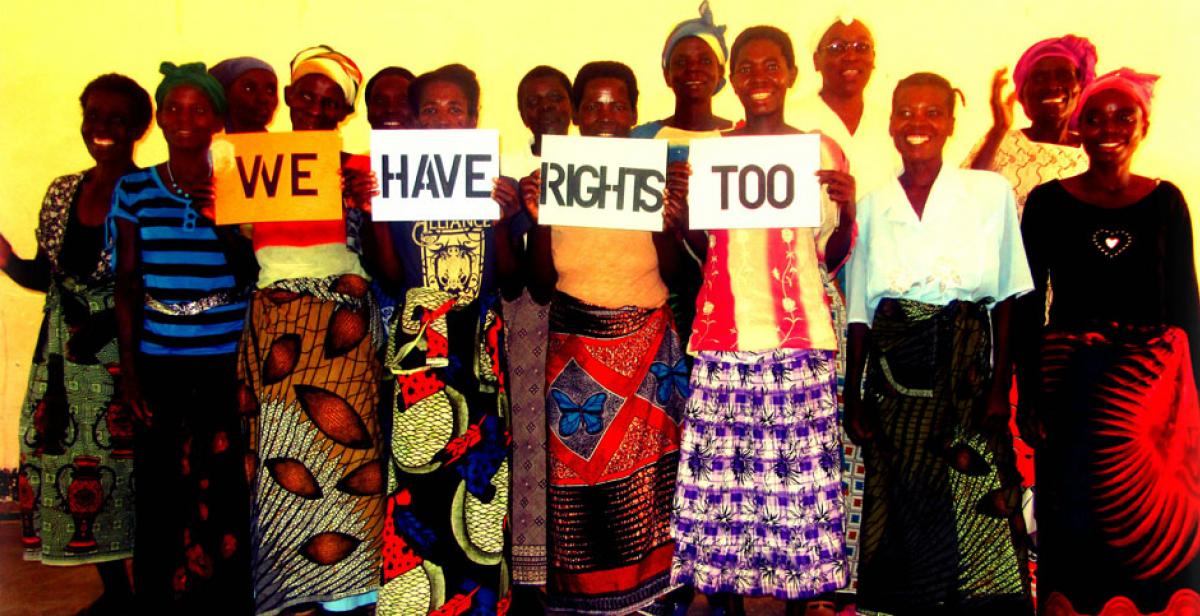We have been visiting Chanzi Support Group for some weeks now and have managed to build very strong relationships with the women within the group. Sian and I, a fellow member of Team Umodzi, took it upon ourselves to create a small visual/media project which we carried out over a selection of visits. Maggie and Selly, our national volunteers, kindly assisted us throughout the project. They did a fantastic job translating for us, we really couldn’t have achieved as much as we have without them!
Our aim was to interview a handful of the women on a one-to-one basis, to gather together stories of the endeavours they have faced since contracting the virus, explain how COWLHA (Coalition of Women Living with HIV and AIDS) has supported them, and then finally explain to us if they have an understanding of their rights.
Sian, who took responsibility for the photography side of this project, wanted to capture the women’s expressions throughout. Our project title is “We Have Rights Too” and we wanted to use posters to illustrate the rights the women felt they have acquired since being involved with COWLHA. This was done towards the end of the interviews by gauging what right they felt belonged to their story - one example being “I have the right to be social”. Sian and Maggie then took one lady off at a time to capture them holding their individual poster. We also created “We Have Rights Too” posters for the four women to hold. One of the reasons behind this project was to allow the women to feel united and also have the chance to express their rights enabling them to feel empowered.
Within minutes of expressing our project idea to the support group, we had our volunteers! Four in fact - all of different ages, from different backgrounds and what turned out to be four extremely different struggles.
A tall tree nestled to the side of the Chanzi building provided the perfect spot to interview our ladies. The outstretched branches offered a canopy of cool protection from the scorching sun, whilst the protruding roots elevated themselves into a comfortable bench where we could perch. Once the Dictaphone was set to record we were ready to get started.
Each of the women communicated so openly about their experiences. They all spoke of what year they had discovered that they had contracted the virus, how life changed for them after that very moment, the support COWLHA gave them and most importantly what ‘right’ they had learnt from their experience. I’d like to share with you Kathrine’s story:
When Kathrine approached us you could sense the sadness which weighed down on her shoulders. Ever so slowly she settled herself down amongst us, eyes constantly fixated on the handkerchief which she clenched so tightly in her lap, stroking it tenderly as if soothing an infant. Kathrine didn’t once make eye contact with us during the interview, and even though she spoke in Chichewa throughout, I could sense the anguish in her voice.
A widowed woman, Kathrine talked to us about her marriage. Kathrine and her husband had three beautiful, healthy, HIV negative children together and she was oblivious to any problems within her marriage. Life was a pleasant stroll for Kathrine and her family until 2005 when she suddenly began to feel very unwell. She caught malaria several times, felt extremely exhausted and knew deep down that something wasn’t right. She went to her local hospital where she was tested for the HIV virus. Kathrine was found positive.
Puzzled, distraught and fuming Kathrine confronted her husband. He was forced to explain that he had cheated on her a few years back with other women and had found out that he had contracted the virus in 2004. He then began taking medication but failed to tell his wife. Kathrine went on to say that during that year when her husband knew that he was HIV positive, he continued having unprotected sex with her.
Kathrine, like so many of the other women at the Chanzi Support Group, contracted HIV from the one person who they should have been able to trust the most - their husband. Kathrine’s husband died shortly after she was diagnosed positive, so not only did she have three children to bring up as a single parent but she also had to deal with the fact that she was HIV positive, put up with the stigma from her community and struggle to make enough money to feed her family. Kathrine never re-married and doesn’t plan to.
Chanzi Support Group was the light that shone through her darkness. Since joining the group Kathrine explained that she now has friends - true and supportive friends who can relate to her circumstances. She has a safe place to escape to and day by day is picking herself back up and looking at life with a more positive attitude. All of which is thanks to COWLHA!
Kathrine’s ‘right’ which she stated at the end of her interview was “I have the right to a happy life”. I truly hope that she continues to live by that.
This project has allowed the team and I to truly understand the trials and tribulations these women have faced. Behind the smiles when they greet us, the songs and dances that they vibrantly perform, these women have all been through a great deal and I have so much respect for them.
The names of the women interviewed from the support group have been changed for confidentiality reasons.
Written by Debbie Burns and photo by Sian Fawcett, members of Team Umodzi (United), based in Nkhotakota



